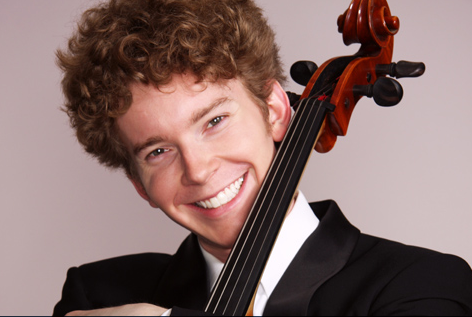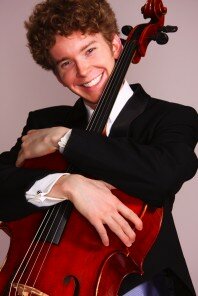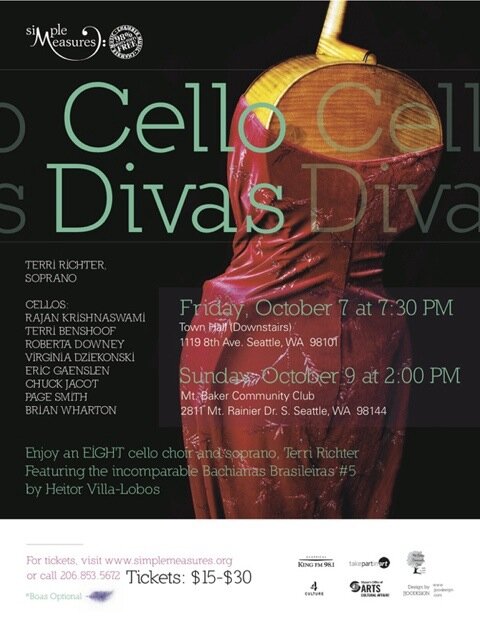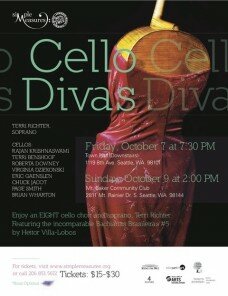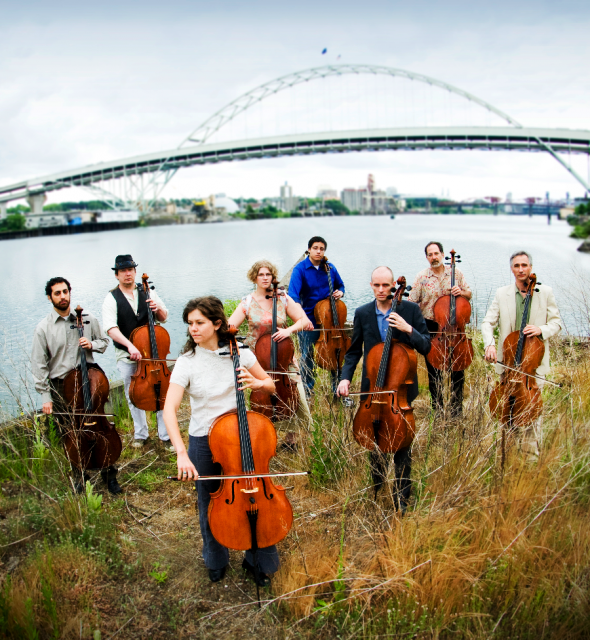
Portland Cello Project knows how to rock. They also know how to jazz, to funk, to rap, and to classical. It seems like there isn’t a musical genre that hasn’t been lovingly remixed by this roving band of cellists. Since 2007, the dozen-or-so musicians of PCP (as they’re lovingly called by members and fans) have pursued their mission to to boldly go where no cello has gone before, from rock clubs and art galleries to sports arenas and dive bars.
The ensemble’s adventurous arrangements and cello-playing chops have won them legions of fans in the Portland area and beyond. After wowing Seattle audiences in 2013 with an eclectic mix of Beck, Bach, and Brubeck, the band returned to the Triple Door on April 20 for an Easter Sunday concert. They were joined by the Alialujah Choir, a band of fellow Portlanders who blend folk-inspired tunes with layered vocal harmonies.
In true PCP spirit, Sunday’s program had something for everyone. Hits by Radiohead, Kanye West, Beck, and Fleet Foxes figured prominently, along with fallen hometown hero Elliott Smith. A nod to the cello’s classical roots came in the form of Rossini’s William Tell Overture and a tribute to British choral composer John Tavener. The ensemble’s take on Dave Brubeck’s “Blue Rondo à la Turk” was one of the most interesting arrangements of the evening, the ensemble tossing Brubeck’s energetic piano theme from cellist to cellist.
Sunday’s concert was performed by six of the ensemble’s rotating group of cellists, all fine players at the top of their game. I was impressed by the quality of PCP’s arrangements, which utilize the full range of the cello and often play with timbre in clever ways. Their arrangement of Tavener’s “The Lamb” brought a buoyant quality to the solemn choral piece, shedding a new light on the Easter-appropriate work. In contrast, the arrangement of the theme from Princess Mononoke echoed the film score to a tee, evoking the soaring string melody of the original.
The six cellists received support on some songs from a backup band of drums, bass, trumpet, and keyboard. Though the rhythm section added a lot of energy to the ensemble, the songs with drums and bass guitar sounded muddled and too busy. The reverb on the bass guitar drowned out the nuanced cello arrangements in some of the more rocking tunes like Radiohead’s “Jigsaw Falling Into Place” and Beck’s “Paper Tiger”. A jazzy cello solo in Brubeck’s “Blue Rondo à la Turk” was barely audible amidst accompaniment from the other cellists as well as the backup band.
Vocalist Patti King also joined the cellists for a few numbers. She quickly became a crowd favorite, drawing cheers for her performances of Radiohead, Beck, and her own original song, “My Arrow”. PCP and King joined forces for a couple of numbers from Beck’s Song Reader, the artist’s 2012 album that was released only in sheet music format. The wry “Last Night You Were a Dream” was full of charm, with King’s sunny vocals floating over cello harmonies.
Not surprisingly, PCP sounds best when focusing on what its members know best: The cello and its vast musical capabilities. My favorite piece of the evening was “Denmark”, an original work written for the ensemble by composer and founding member Gideon Freudmann. A tentative pizzicato phrase kicks off the tune, transforming into a countermelody as the layers of the piece slowly unfold, revealing an elegant theme that’s passed around the group. It’s a short, relatively simple little piece, but “Denmark” goes far in showcasing the range and versatility of the cello ensemble.
In the spirit of Portland-flavored DIY, Sunday’s program was a true community effort, bringing together arrangements by different members of the band. With a repertoire of over 800 songs, it’s easy to believe that no two PCP shows are alike. I appreciated the opportunity to hear from each of the six cellists during their Triple Door performance, whether it be in the form of a solo passage or through a piece they arranged.
Alialujah Choir opened the evening with a brief set. With one band member missing due to illness, guitarist Adam Shearer and pianist Meredith Adelaide struggled to impart fullness to the group’s brand of wistful folk tunes. Their efforts were valiant indeed, with the pair’s lovely vocal harmonies floating in perfect balance with intertwining instrumentals. However, without the harmonizing power of the full band, the typically-rich songs felt a little hollow and repetitive after the first few numbers.
Keep an eye on Alialujah Choir for a chance to catch them in full force and health. They’ll be touring Oregon, Idaho, and the Southwest with Blitzen Trapper this fall.
